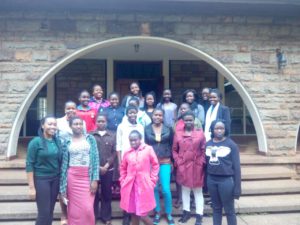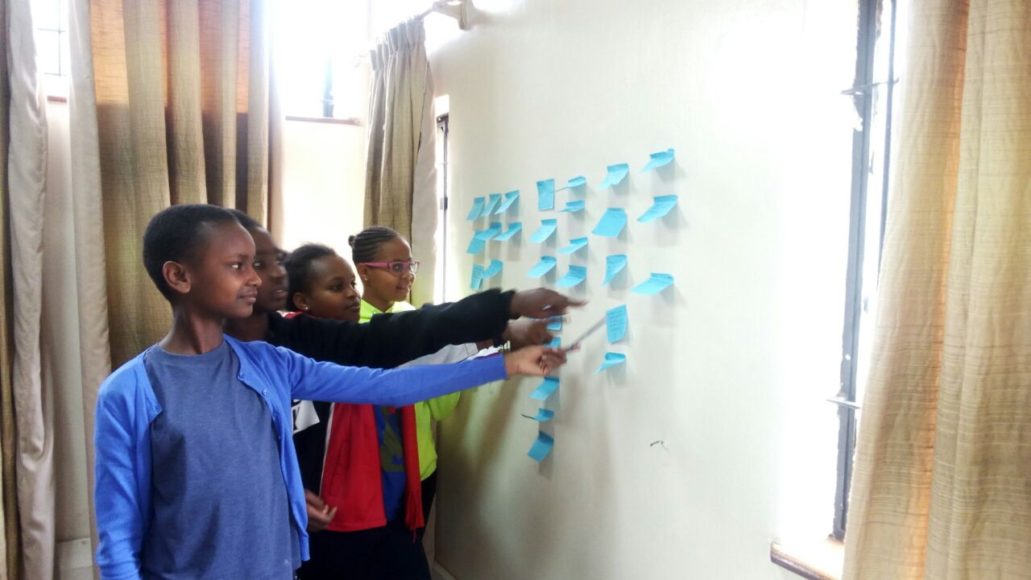Visionaria activities in Kenya helped young women find direction and motivation to engage more fully in their mentorship program and prepare for their final year of secondary school – and beyond.
Celestine M’mbolo is a professional educator, a consultant with Strathmore Energy Research Center (SERC) and a certified Empowered Entrepreneur trainer at Strathmore University. Visionaria Network had the chance to support Celestine over the last year through the Empowered Entrepreneur Training Program earlier this year.
In August Celestine independently led a 2-day workshop for girls as part of the Macheo Secondary School Program outside of Nairobi, Kenya. Macheo provides resources to guardians and mentorship for at-risk adolescents to continue their education and become part of the 20% of Kenyans to complete secondary school (Source: Macheo Secondary School Program).
The goal was to motivate high school girls in their final year, along with their mentors who are 4th year students at Strathmore University, to meet more often and take a growth mindset into their final of the program before graduating.
She approached Genevieve Smith and Paul Spurzem (co-founders, Visionaria Network) for some advice using the Empowered Entrepreneur Training methods with younger people – and decided to try out some Visionaria lessons in the hopes that she will get more approval to support Macheo mentors and students throughout the year.
Trying out Visionaria
Celestine caught up with the Visionaria Team over a Whatsapp call when preparing her workshops at the end of September.
Celestine has been training and teaching young people for 11 years, and now works for Strathmore University as a business and entrepreneurship trainer and coach. Celestine is one of over 60 certified empowered entrepreneur trainers, meaning she has been trained herself to conduct programs that emphasizes agency-based empowerment and leadership practice in addition to technical business skills for entrepreneurs.
She was originally trained by Genevieve Smith, co-founder of Visionaria Network, in 2017 as part of Winrock International’s Developing a Sustainable Cookstove Sector project, and thought she might have ideas for using the same set of activities with adolescent girls.
She remains passionate about improving the quality and access to education throughout Kenya. She understands what it takes for them to be successful in a changing world, and sees an urgent need to prepare them differently. “These days, young people aren’t thinking,” she lamented, “they spend all their free time on the net and social media.” She claims they are unprepared to be seriously challenged, and the reality of their situation sets in hard when they reach the working age. Young people need to be brought “out of their comfort zones and in a real situation, to get themselves involved in improving it.”
She decided to use Visionaria lessons to help students discover their best qualities, discuss examples of visionary leaders, and map out representations of their past, their current, and their future – in the shape of a tree, including representations of how Macheo mentors will fit in and help them grow towards their ultimate goals.

Celestine debriefed with the Visionaria Team the following week, reporting some interesting interactions and results:
- She says that the Visionaria lessons helped her, as a facilitator, discover the leadership skills and traits the girls already possessed, but didn’t know of yet. One lesson “Leadership, Many Forms”, focuses on the variety of leaders that exist every day, everywhere – not just in positions of great visibility.
- One participant shared most courageous act, when she had to take care of her grandmother for an entire year. [<- maybe too much]
- Celestine wasn’t initially aware of it, but the girls realized that they were sitting in parts of the room according to their tribes. They remarked that one’s tribe doesn’t change whether they are a good leader or not, and they realized that their tribal afiliations often kept them from opening up to others – which leaders should do.
- They all went home thinking “I have something in relation to leadership. I can work on these skills in me to improve.”
Beyond Tribes
 Discussions of leadership were particularly timely, following the heels of a national election that remains contested in Kenya, Celestine’s participants were acutely aware of political divides and posturing by hopeful leaders.
Discussions of leadership were particularly timely, following the heels of a national election that remains contested in Kenya, Celestine’s participants were acutely aware of political divides and posturing by hopeful leaders.
Leading up to the most recent national election, one politician noted that “in 10 to 30 years, we will move on from this. We will base our decisions on what the candidates offer, for example, tax breaks or better and cheaper healthcare.”
Young women agree that they need to move beyond their tribal bias to focus on leadership qualities they desire.
As a result of the facilitated discussions, they walked away with the idea that we have to look at “the whole good of the person”, and not just assume that the political candidate from your tribe must be the better leader.
Celestine agrees, and is thankful that Visionaria lessons exist to help more young women and men set aside their bias, in order to choose and become the leaders they deserve. The sooner, the better.
The team behind Visionaria Network has employed a unique empowerment and leadership methods with young people since 2012, and we are happy to support Celestine and other educators around the world to integrate Visionaria’s activities – in extra-curricular and regular class-time programming.
Learn more about our Visionaria for Schools program Donate to support Visionaria training and support for facilitators like Celestine


